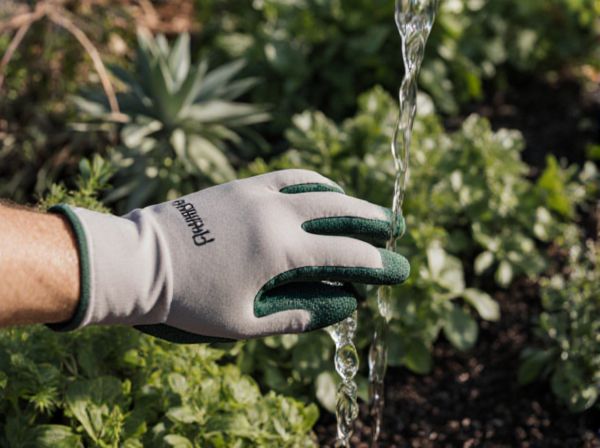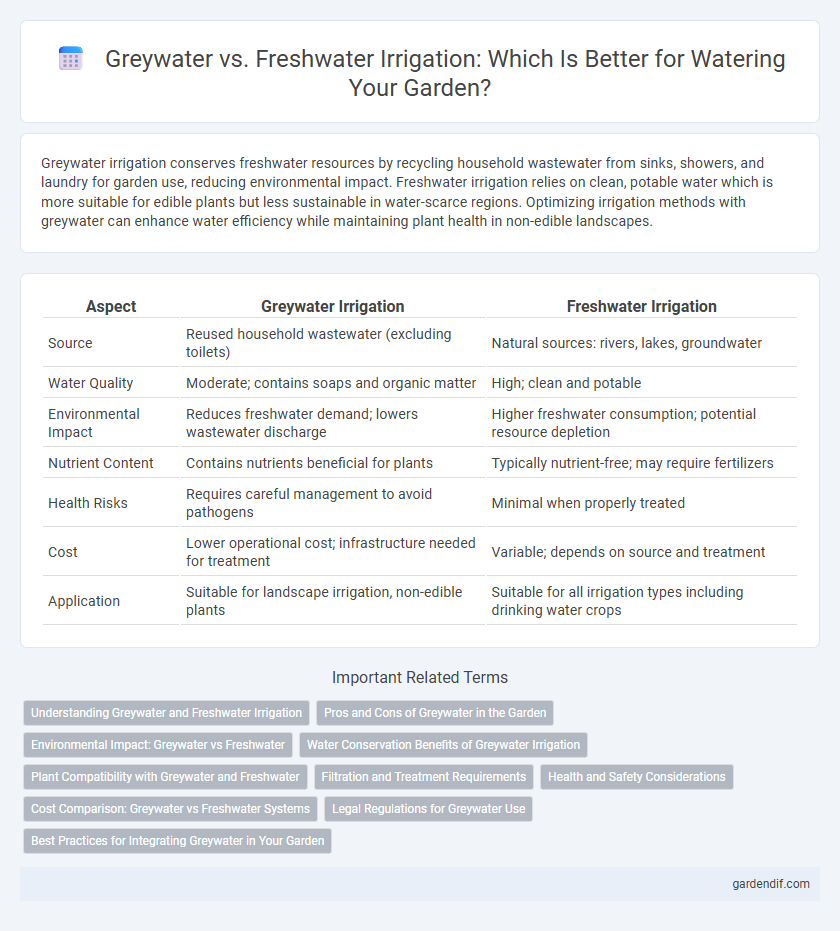
Greywater vs Freshwater irrigation Illustration
Greywater irrigation conserves freshwater resources by recycling household wastewater from sinks, showers, and laundry for garden use, reducing environmental impact. Freshwater irrigation relies on clean, potable water which is more suitable for edible plants but less sustainable in water-scarce regions. Optimizing irrigation methods with greywater can enhance water efficiency while maintaining plant health in non-edible landscapes.
Table of Comparison
| Aspect | Greywater Irrigation | Freshwater Irrigation |
|---|---|---|
| Source | Reused household wastewater (excluding toilets) | Natural sources: rivers, lakes, groundwater |
| Water Quality | Moderate; contains soaps and organic matter | High; clean and potable |
| Environmental Impact | Reduces freshwater demand; lowers wastewater discharge | Higher freshwater consumption; potential resource depletion |
| Nutrient Content | Contains nutrients beneficial for plants | Typically nutrient-free; may require fertilizers |
| Health Risks | Requires careful management to avoid pathogens | Minimal when properly treated |
| Cost | Lower operational cost; infrastructure needed for treatment | Variable; depends on source and treatment |
| Application | Suitable for landscape irrigation, non-edible plants | Suitable for all irrigation types including drinking water crops |
Understanding Greywater and Freshwater Irrigation
Greywater irrigation utilizes reused household wastewater from sinks, showers, and laundry, reducing freshwater consumption and promoting sustainable water management. Freshwater irrigation relies on clean, potable water sources that support plant growth but often lead to increased demand on limited water supplies. Understanding the benefits and limitations of both techniques is essential for optimizing water use efficiency and maintaining soil health in agricultural and landscape applications.
Pros and Cons of Greywater in the Garden
Greywater irrigation conserves freshwater by reusing household wastewater from sinks, showers, and laundry, reducing water consumption and utility costs while promoting sustainable gardening practices. However, greywater may contain contaminants such as detergents and pathogens, requiring proper treatment or filtration to prevent soil and plant damage as well as potential health risks. Utilizing greywater helps maintain garden moisture during droughts but demands careful management to avoid salinity buildup and ensure soil fertility.
Environmental Impact: Greywater vs Freshwater
Greywater irrigation significantly reduces freshwater consumption by reusing household wastewater, decreasing strain on natural water sources and mitigating drought impacts. Utilizing greywater lowers nutrient runoff and chemical contamination compared to freshwater, promoting healthier soil ecosystems and reducing pollution in aquatic environments. This sustainable practice conserves potable water and minimizes the environmental footprint associated with traditional freshwater irrigation.
Water Conservation Benefits of Greywater Irrigation
Greywater irrigation significantly reduces freshwater consumption by reusing household wastewater from sinks, showers, and laundry for landscape watering. This method conserves up to 50% of potable water used in irrigation, easing pressure on municipal water supplies and lowering utility costs. Utilizing greywater also decreases the volume of wastewater entering treatment systems, contributing to sustainable water management and environmental protection.
Plant Compatibility with Greywater and Freshwater
Plants irrigated with greywater often require species with higher salt and detergent tolerance, such as certain shrubs, trees, and hardy perennials, to avoid toxicity and soil degradation. Freshwater irrigation supports a broader range of plant types, including sensitive vegetables, fruits, and ornamental plants, due to its low contaminant levels and balanced nutrient content. Selecting appropriate plant species based on water source is critical for sustainable irrigation management and long-term soil health.
Filtration and Treatment Requirements
Greywater irrigation requires moderate filtration to remove soap, hair, and organic debris, with treatment focusing on reducing pathogens to protect plants and soil health. Freshwater irrigation demands minimal filtration, primarily filtering out sediments to prevent clogging but does not require extensive pathogen treatment. Properly designed greywater systems incorporate biological or mechanical filters and disinfection processes to ensure safe reuse, whereas freshwater can often be used directly or with basic filtration.
Health and Safety Considerations
Greywater irrigation reduces freshwater consumption by reusing wastewater from baths, sinks, and washing machines, but requires careful treatment to prevent pathogens and chemical contaminants from affecting soil and crops. Freshwater irrigation poses fewer health risks but is less sustainable due to limited supply and potential over-extraction of natural water sources. Proper filtration, disinfection, and regulatory compliance are essential to ensure safe greywater use in agricultural and landscaping practices.
Cost Comparison: Greywater vs Freshwater Systems
Greywater irrigation systems typically incur lower operational costs compared to freshwater systems due to reduced consumption of potable water and decreased water bills. Initial installation expenses for greywater systems may be higher because of filtration and storage infrastructure requirements, but long-term savings offset these upfront costs. In contrast, freshwater irrigation demands continuous supply and treatment costs, leading to higher overall expenditure in regions with water scarcity or high tariffs.
Legal Regulations for Greywater Use
Legal regulations for greywater use in irrigation vary significantly by region, with many jurisdictions imposing strict guidelines on treatment, storage, and application to protect public health and the environment. Typically, greywater must meet specific quality standards, and its use is often restricted to subsurface irrigation or non-food plants to prevent contamination. Compliance with local laws ensures sustainable water reuse while minimizing risks associated with pathogens and chemical contaminants present in untreated greywater.
Best Practices for Integrating Greywater in Your Garden
Greywater irrigation conserves freshwater by recycling household wastewater from sinks, showers, and laundry, making it an eco-friendly alternative for garden watering. Best practices include using biodegradable soaps, avoiding greywater from kitchen sinks due to high grease content, and applying the water directly to soil rather than foliage to prevent plant damage and pathogen risks. Installing a greywater system with proper filtration and regular maintenance enhances garden health while reducing overall water consumption.
Greywater vs Freshwater irrigation Infographic

 gardendif.com
gardendif.com